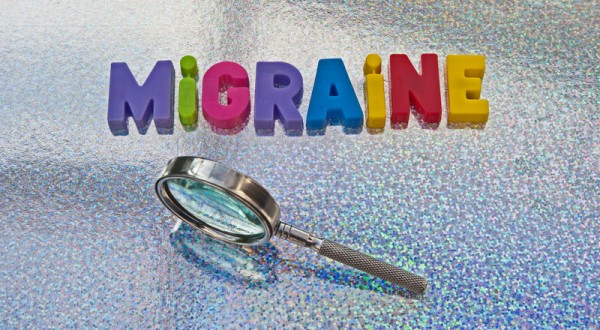There are many obvious advantages to maintaining a healthy body weight. Sometimes as a migraine sufferer you may be a little fearful though how a specific weight loss program may affect your migraines. There are some good reasons for you to be cautious. Did you know that some of your weight loss efforts can have an adverse effect on your migraines?
Some research suggests that there is an association between Body Mass Index (BMI) and the prevalence, severity and frequency of your migraines.
If you have migraines and want to lose weight, before you commit to a special weight loss program, make sure you are doing something that is healthy and will help your migraines rather than making them worse.
Maintaining a healthy body weight is not easy — believe me I know from personal experience! However, it is especially important if you suffer with episodic Migraine that you keep your BMI in the healthy range, because obesity is one of the risk factors for chronic migraine.
Losing weight can be even more difficult for people who get migraines, because some diets, supplements, and exercises, can actually trigger migraines. This causes us to become so disheartened that we throw our efforts out of the window. However, there are many healthy weight loss methods available that will produce results without triggering migraines. For me in my own life, I have found a great way to eat that has absolutely changed my migraine life.
4 Weight Loss Tactics That Can Trigger Migraines
Common migraine triggers include food, strenuous exercise, hormones, weather and stress (among other things). In the same way each person experiences migraine differently, different people respond to different triggers.
Learning about triggers is the first step to identifying your own. Avoiding your migraine triggers and maintaining a healthy body weight will help keep the distressing pain.
1. Irregular or skipped meals. Low blood sugar, or hypoglycemia, is a common migraine trigger. Skipping meals to lose weight is not a healthy or migraine-friendly tactic. The brain reacts to rapid changes in blood sugar or to blood sugar that is too low with a migraine or headache. Avoid being restrictive with your calories. If you are restricting carbohydrates, do so slowly or replace simple carbohydrates with whole-grain options.
Tip: Eating several small, protein-rich meals a day will keep your blood sugar steady. Steady blood sugar means fewer migraines and less temptation to over-indulge. Having healthy snacks, like almonds or hummus, is a good way to prevent your blood sugar from getting too low and potentially triggering an attack.
Try to eat whole foods prepared at home. Avoid the middle aisles of the supermarket where the processed food is found for maximum relief and results.
2. Diet sodas and artificial sweeteners. If you have experienced migraine pain after eating foods and drinks that are artificially sweetened with Aspartame, etc., this should give you cause to re-evaluate the sweeteners you are using. I know when you want to lose weight that is seems like a great idea to replace natural sugar with Aspartame-containing sweeteners to cut your calorie intake, but these types of sweeteners can potentially cause migraines.
Many of our foods contain these artificial sweeteners — like sodas, chewing gums, sugar-free cookies and iced teas. Learning to read food labels carefully can help you avoid food triggers which will help you understand and manage your migraines.
Tip: Look for other natural, Aspartame-free options like stevia. Not only is this better for your overall health, but you will experience fewer migraines. Natural sugars like honey and Agave syrup are good alternatives. However, consume them in small quantities.
3. Caffeine. Occasional caffeine can help improve migraines as it works as a pain reliever and aids in better absorption of pain medication. However, we all react differently to caffeine. Too much caffeine can cause addiction, and then if you suddenly stop drinking it, it can cause severe “withdrawal headaches,” which often turn into migraines=.
Tip: Watch how you respond to caffeine, and avoid it if it gives you a migraine. If you do drink caffeine, try to drink the same amount each day to avoid a rebound headache. Herbal teas, home-made soda, and flavored water are good, caffeine-free alternatives.
4. Overly strenuous exercise. If you notice that your migraines increase after starting a new exercise program, chances are that you are experiencing exercise-induced migraine. According to a research study, 38 percent of the participants experienced migraine after exercise. While it is difficult to point a specific reason for this pain, it could be caused by changes in blood pressure during exercise. Certain vigorous sports like weightlifting, rowing, running and football are the common triggers.
Tip: Low intensity exercises like yoga, walking, swimming, and biking can help you move your body and lose weight without triggering a migraine. In fact if you are consistent with a good non-strenuous or migraine-inducing exercise, it can actually help prevent migraines.
Conclusion
In closing, let me encourage you try a well-rounded diet that is made up of whole foods and not processed foods. Exercise regularly if you can, but begin slowly. Adopt a healthy lifestyle with smart food choices to prevent migraine. Eat foods that are rich in magnesium and riboflavin. Most important, but often overlooked — keep yourself well hydrated. Prevention is the best treatment and maintaining a healthy BMI will set you on the right path to fewer migraines.
Our bodies don’t need the strange additives that are found in packaged foods. I know that for many of you, “eating clean” (no processed foods) is easier said than done. However, I challenge you to take one week and try eating clean and see what effect is has on your migraines. Then be sure to give me some feedback in the comments below. I know that this has radically changed my “migraine life” and I believe it can help you too.


